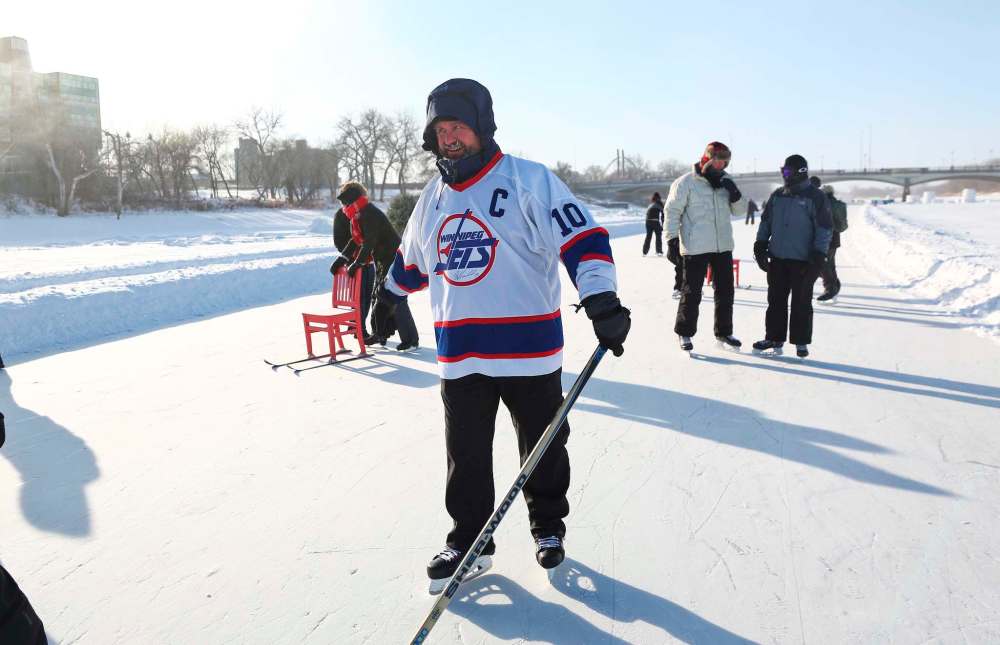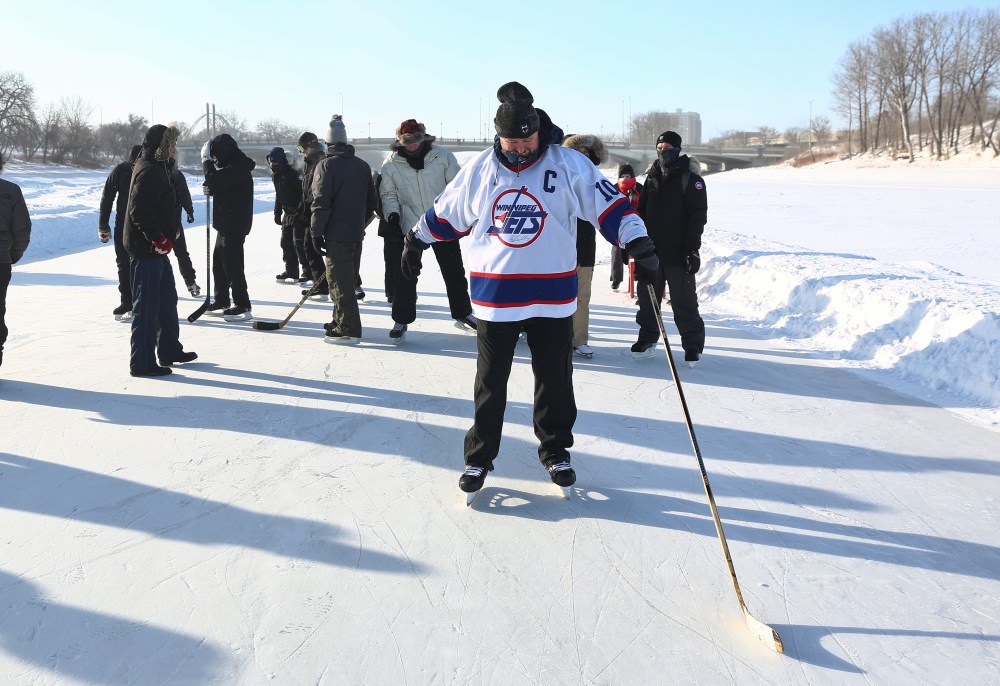Embracing life to its fullest and at its coldest
American war vet's journey through physical and mental struggles leads to Winnipeg and a newfound love of hockey
Advertisement
Read this article for free:
or
Already have an account? Log in here »
To continue reading, please subscribe:
Monthly Digital Subscription
$0 for the first 4 weeks*
- Enjoy unlimited reading on winnipegfreepress.com
- Read the E-Edition, our digital replica newspaper
- Access News Break, our award-winning app
- Play interactive puzzles
*No charge for 4 weeks then price increases to the regular rate of $19.00 plus GST every four weeks. Offer available to new and qualified returning subscribers only. Cancel any time.
Monthly Digital Subscription
$4.75/week*
- Enjoy unlimited reading on winnipegfreepress.com
- Read the E-Edition, our digital replica newspaper
- Access News Break, our award-winning app
- Play interactive puzzles
*Billed as $19 plus GST every four weeks. Cancel any time.
To continue reading, please subscribe:
Add Free Press access to your Brandon Sun subscription for only an additional
$1 for the first 4 weeks*
*Your next subscription payment will increase by $1.00 and you will be charged $16.99 plus GST for four weeks. After four weeks, your payment will increase to $23.99 plus GST every four weeks.
Read unlimited articles for free today:
or
Already have an account? Log in here »
Hey there, time traveller!
This article was published 30/01/2019 (2510 days ago), so information in it may no longer be current.
At first glance, it would appear to be a perfectly ordinary scene to any observer. A man, bundled up in winter gear and sporting a Winnipeg Jets jersey, skating down the Red River on a frigid winter day.
But there was nothing ordinary about what happened Wednesday morning at The Forks.
Lacing up the blades was James Hatch, a former U.S. Navy SEAL, whose exemplary military career, which is the stuff of movies, came to tragic end.

Hatch, who is from Virginia, arrived in the city Tuesday to make good on a bizarre bet with some Winnipeg friends that boiled down to one question: would the Winnipeg Jets or Carolina Hurricanes have more points at the end of the 2017-18 NHL regular season?
You can guess who Hatch hitched his wagon to.
“I’m an idiot. I made a stupid bet. I do that a little too often. Now at the age of 51, I’ve learned I should probably stop doing that,” Hatch said.
The Jets had a franchise-record 114 points. The Hurricanes missed the playoffs by a mile with 83 points.
“Stupid bet on three!” said Hatch, as he posed for pictures with more than a dozen supporters who joined him on the ice, including several retired and current military members who flew in from the U.S. with him.
Hatch pulled on a Dale Hawerchuk jersey, then bit a hockey stick for good measure. His attempt to sneakily put a Hurricanes tuque on his head was met with loud jeers.
“That’s humiliating,” Hatch said, when someone in the group suggested he use one of the walker-type devices that novice skaters use. He managed to stay upright during the 20-minute twirl.
“My stick helped keep me up,” he said.
This story would be unique if it was just about the circumstances that brought Hatch to Winnipeg to skate outdoors on the coldest day in 12 years, in which the overnight temperature dipped down to -39.8 C.
“It’s beautiful out there,” he joked.
But there’s more to it, just like there’s so much more to Hatch.
He’s not just a decorated war hero, but also a PTSD survivor turned author who is trying to make the world a better place. Even if he admits there were many times he no longer wanted to be a part of it.
Hatch fell into a deep depression after the attempt to rescue army deserter Bowe Bergdahl in Afghanistan in 2009.
The longtime member of the Naval Special Warfare Development Group, known more commonly as SEAL Team 6, Hatch was shot in the right leg during the mission, which would be about the 150th and final of his career.
Bergdahl pleaded guilty to deserting and endangering fellow service members. He received a dishonourable discharge, but no prison time.
Hatch underwent 18 surgeries. There were times he pleaded with doctors just to amputate his leg to spare him the daily agony.
Hatch had to learn how to walk again. He was also racked with guilt, believing his own injury put other troops in danger. He also mourned the loss of a military dog named Remco, who was shot and killed.
There were multiple suicide attempts, including one night where he placed a loaded gun in his mouth while drunk and high on painkillers. His wife disarmed him before he could pull the trigger.

Hatch was admitted to a naval treatment centre for mental health treatment. He’s documented his long road of recovery in his new book, Touching the Dragon and Other Techniques for Surviving Life’s Wars, and now speaks candidly about what he went through in the hopes of helping others.
Hatch has tried to give back by helping police and military dogs through a charity, Spike’s K9 Fund. It provides working canines with the necessary gear needed for them to stay safe on the job, including ballistic vests. The non-profit was set up in honour of another dog, Spike, who died in Iraq after Hatch shot and killed an insurgent, only to have the bullet go through his body and kill the animal.
Hatch still has Spike’s harness at home and carries his ashes with him in an amulet. His work with Spike’s K9 Fund set in motion the chain of events that brought him to Winnipeg.
Enter Jim Slater, a retired Winnipeg police officer who knows a few things about the dangers of front-line work. As a rookie cop in 1987, Slater was struck with a pellet in his left eye while responding to a domestic incident. A distraught woman had fired a shotgun blast before being arrested.
Despite being partially blinded, Slater went on to have a distinguished 20-year police career, doing his finest work in the K9 unit along with his four-legged partner, Olaf. They made 285 documented arrests together.
Slater also started a side business, K9 Storm, which began manufacturing specialized gear for military dogs. The idea was born after Slater and Olaf responded to the infamous Headingley Jail riot in Manitoba in 1996.
The company really took off once Slater could devote all of his time to it. They help outfit special forces teams, police agencies, and search-and-rescue groups in more than 30 countries.
Slater got to know Hatch because of K9 Storm.
“It was shared interest, a love of dogs, the love and respect of the jobs they’re capable of doing. It was just a good fit personality-wise, I’ve got nothing but respect for him,” Slater told the Free Press.
Naturally, they talked about hockey.
Hatch had only seen a handful of hockey games on TV before he was invited to a Carolina game a couple of years ago to be honoured during the intermission for his years of military service.
It was while standing near the glass, with the minutes ticking down in the second period, that he had a revelation.
“I’d seen hockey in the past but never got that close. I got near the ice and saw how big those guys were and how fast they were moving. I was absolutely blown away. I mean really, it rattled me,” said Hatch.
Following the game, he got to meet several players. One of them was Bryan Bickell, a scratch that night as he continued to undergo treatment for multiple sclerosis.
“His attitude, I was really surprised how positive he was. It was a good example. After I got hurt I didn’t want to be around my crew at all, I felt like I didn’t belong there anymore,” Hatch recalled.
“I really admired him. I talked to him for maybe 10 minutes, but he had quite an impact on me. It was a really good experience for me personally.”
Hatch was hoping to win the Hurricanes vs Jets bet, as it would have brought Slater and his sons, Jeff and Riley, to Virginia to face their fears from the air.
“He kind of picked his thing of choice which was skydiving, which is something that’s not a big deal for him. For us it’s obviously quite scary,” Riley told the Free Press.

“I try not to bet unless I know I have a good chance of winning, and for this one I felt quite confident. We were trying to think of something that was inherent in Winnipeg, that obviously we’d be well equipped to handle and deal with. Cold for one, skating for two. (Hatch) was shot in the leg, for him it’s very scary for him to be coming to do this.”
Hatch had never strapped on skates until a few weeks ago but wanted to be prepared, getting a couple brief skating lessons from friends at indoor rinks,
“I had a friend give me some skates, so I practised a few times. It was difficult. It made me appreciate hockey players even more. They’re something else,” said Hatch.
His visit to Winnipeg includes a talk Wednesday evening at the King’s Head pub before an invitation-only audience. It worked out perfectly that it occurs on Bell Let’s Talk Day, which is meant to bring discussion about mental illness into the open,
“I’ve realized there are things that I’ve experienced that aren’t all that original, which at first was a bit disheartening because I thought I was a special guy,” said Hatch.
“The truth is you don’t have to have been in combat like I was to experience traumas in your life that are difficult to deal with. Especially in this day and age where we think ‘hey I’m a tough guy, I can do everything on my own.’ It’s unfortunate, I think it leads to a lot of problems similar to what I had. I’m not afraid to talk about the crazy things I thought about, the failures.”
Slater can relate because he experienced dark moments after getting shot.
“It just goes back to beating down the stigma. If something’s on your mind, it’s better to share it, unload. It goes across the whole spectrum of people. whether you’re 15 or 90, it doesn’t matter. You need to unload it,” he said.
Hatch was also happy to hear about Project 11, created by True North in honour of former player Rick Rypien, who died by suicide in 2011. Founder Craig Heisinger is among the guests expected to attend Hatch’s talk Wednesday evening.
“I’m glad there’s organizations out there like Project 11 that attack it at the beginning, where it can start to develop. Once you’re already there you’re depressed, you’re abusing, you’re using drugs or whatever,” said Hatch.
“That’s an amazing thing. That should be an international thing.”
And while he may not be applauding the idea of skating down the river with a -50 wind chill, Hatch is definitely now a fan of Winnipeg. And, somewhat grudgingly, even the Jets.
mike.mcintyre@freepress.mb.ca
Twitter: @mikemcintyrewpg

Mike McIntyre grew up wanting to be a professional wrestler. But when that dream fizzled, he put all his brawn into becoming a professional writer.
Our newsroom depends on a growing audience of readers to power our journalism. If you are not a paid reader, please consider becoming a subscriber.
Our newsroom depends on its audience of readers to power our journalism. Thank you for your support.


